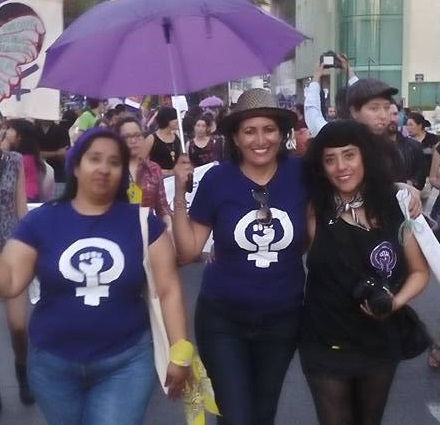Foto: Eva Da Porta
Guadalupe Ramos Ponce: An interview about libertarian education, the right to their bodies and the fight against gender violence
March 29, 2019
In this dialogue on the occasion of International Women’s Day, Guadalupe Ramos Ponce, lawyer, feminist and coordinator of CLADEM in Jalisco, deals with issues such as: education, gender equity and equality, gender violence and the conservative advance that has resulted in setbacks for the rights of women and for the freedom of women to decide on their bodies.

“All education has to be non-sexist, non-discriminatory, an education without phobias, without fears, a libertarian education which promotes the right to live a life without violence. But, to achieve all these aspirations, we have to promote comprehensive sexual education with a gender perspective and human rights. (…) An education in this way will not only strengthen the promotion of egalitarian gender relations, but also the construction of democratic states that respect human rights”, said Guadalupe Ramos Ponce, lawyer, feminist, professor and researcher of the University of Guadalajara, defender of Human Rights and coordinator of the Latin American and Caribbean Committee for the Defense of Women’s Rights (CLADEM) in Jalisco, Mexico.
She shared this testimony during a dialogue with the Latin American Campaign for the Right to Education (CLADE) and the Latin American Association of Education and Popular Communication (ALER), on the occasion of the 2019 celebrations of International Women’s Day.
In the interview, Guadalupe deals with the real importance of remembering this date, which is far from being a day to receive gifts and is – according to her – a day of struggle for the rights of girls and women. “It is a day of commemoration, but also a day of action regarding the status of women, what is happening in the world, especially in Latin America and the Caribbean, with their social, political, legal status and also by the the issue of women’s education, and how progress has been made in relation to the gaps of historical inequalities that we have experienced. That day is a day of struggle and to continue demanding all that we need”, she says.
Several topics were addressed in the interview, from the importance of topics and approaches of gender and sexuality being dealt with in education, as well as the fight against violence and the struggle so that women can decide on their bodies.
“The women’s body becomes a battlefield. There we find explanations for sexual harassment, stalking and for the question ‘Why do they shout at us and tell us things when we walk down the street?’ It is a way of inhibiting our presence in a public space such as the street. Why when do we sometimes find hostility when we attend places such as schools and universities, from a teacher who harasses and stalks us and so on? It is a way to discourage the presence of women there,” says Guadalupe.
Read the full interview:
How is education in Latin America and the Caribbean regarding gender equality and equity?
Guadalupe Ramos Ponce – Before answering this question, I would like to start with a very brief reflection on March 8 because it has been distorted, especially in recent years. The institutions, the States, have been in charge of distorting March 8 as a day of celebration, a day when they give you a little flower, and on that date everyone sends you congratulations for being a woman.
History of March 8
As Guadalupe Ramos Ponce explained, this date is far from being a holiday. Its origin is framed in a historical and ideological context of women’s struggles, determined by profound gender inequalities.
On March 8, 1857, a momentous event marked the history of labor and the union struggle throughout the world: 129 women died in a fire at the Cotton factory in New York, United States, after they went on strike with permanence in their workplace.
These women mobilized to demand the reduction of their working hours to 10 hours, a salary equal to that received by men for the same activities and measures to address the poor working conditions they suffered. The owner of the factory ordered to close the doors of the building to force the protesters to leave the place. However, the result was the death of the workers inside the factory.
The protest and death of these women sparked other rallies, acts and conferences until, in 1977, the General Assembly of the United Nations (UN) officially designated March 8 as the International Women’s Day.
I think it is important to begin with the reflection that it is a day of commemoration, but also a day of action on the status of women, what is happening in the world, especially in Latin America and the Caribbean, with their social, political, legal status and also for the issue of women’s education. It is a day of struggle and to continue demanding all that we need.
In relation to the question, the entire region of Latin America and the Caribbean has had historical relevance for the great inequality gaps between the population groups – for example, in the same region, countries such as Uruguay, Costa Rica or Argentina have much higher education levels than Guatemala, Bolivia and Peru.
In the last decade, although the gaps between women and men in terms of education have been reduced – because women started to attend formal education, high school and universities, and in some cases being the majority – in other places we found that such gaps continue to increase.
How should the gender equality perspective be dealt with in education?
Guadalupe Ramos Ponce – The gender perspective is an analysis perspective that allows us to review and look at the status of women’s education in the region.
While we have seen the struggle of social grassroots for gender equality, at the same time, we have found – especially in recent years – a repositioning of extreme right groups that, in the face of the significant advances attained in terms of women’s rights, they begin to encourage opposition and, in some cases, even setbacks with the discourse of the so-called “gender ideology”, as a way to delegitimize these important advances that have been made.
There have been advances in terms of raising awareness on the historical disadvantages suffered by women and that, therefore, required a series of affirmative actions in the region to reduce these inequality gaps.
Are equity and gender equality the same thing?
Guadalupe Ramos Ponce – Equity is the way to achieve equality. I give you a very simple example: when I give each of my students (male and female) an apple, in the classroom, I am apparently doing an egalitarian action, but it’s not true.
In order to be able to contribute to overcome the inequality in which women and men live, I have to look – and for that the gender perspective helps me – what is the situation that each and every one has, not only in the classroom, but at home, in social and family life? Then, I’m going to realize that, at home, some have a kilo of apples, but there are others who have not even seen an apple in their life. Then, some will receive an apple, others will receive three apples and possibly some will not receive an apple. That is fairness, it is fair, because I looked at the condition of each one to give them according to their circumstance, and in this way I take steps to achieve equality.
Thinking about educational spaces, beyond the classroom, what is the importance of addressing gender and sexuality issues?
Guadalupe Ramos Ponce – Of course, all education must be non-sexist, non-discriminatory, education without phobias, without fears, a libertarian education and which promotes the right to live a life without violence.
But, to achieve all these aspirations, we have to promote comprehensive sexual education with a gender and human rights perspective. This means that the approach has to be so broad that it encompasses sexual and reproductive rights, sexual health, diversity, sexual orientation and gender identity, autonomy, access to information, sexual freedom, promotion of free and responsible decisions, and overcoming all types of stereotypes and discrimination.
An education in this way will not only strengthen the promotion of egalitarian gender relations, but also the construction of democratic states that respect human rights.
What are the negative consequences for students of excluding gender and sexuality issues from educational spaces?
Guadalupe Ramos Ponce – We are already experiencing these effects, and in fact what we have to do is look at this reality. When we do not educate in this integral way as we have indicated and when it comes to preventing comprehensive sexual education, the consequences are dire.
In recent weeks, we have had two cases of two girls – one eleven and another twelve years old – pregnant, the product of sexual violence and forced to experience these births. They applied caesarean sections and had to undergo situations of unspeakable torture.
This happened in a case of sexual violence, but there are other situations in which ignorance, misinformation prevails, and with this we are leading to an increase in violence against girls and women in the region.
There is a trend in our region, a presence of conservative movements in the face of the incorporation of sexuality and gender issues, and also of political debate, in educational systems. In Brazil, for example, we have the “School without Party” movement, and in Peru and Ecuador “Don’t mess with my children”. How do we explain the strength of this conservative trend?
Guadalupe Ramos Ponce –I made a very specific analysis in the case of Mexico, when these “Don’t mess with my children” groups formed in networks at national level to prevent the enactment of laws.
“Behind this idea of gender ideology there is a great persecution of sexual diversity issues”
Read CLADE’s interview with Nilma Lino Gomes, former minister of the Ministry of Women, Racial Equality and Human Rights during the government of Dilma Rousseff. The dialogue talks about current threats to the rights of girls, women and LGBTI persons in Brazil, and the importance of discussing gender and different forms of discrimination is present in schools.
There was a whole package of legislative reforms that had been proposed in the previous administration, by the former president, and took the Congress of the Union, the Chamber of Deputies. This package proposed, in addition to equal marriage, identity changes – so that all people regardless of their diversity and identity could be legally protected with juridical certainty – and a series of rights. Through this “Don’t mess with my children” campaign, promoted throughout the country, they managed to prevent the approval of these legislative reforms, which meant an important setback.
Why do they have so much power, even to prevent this reform and advances in Mexico and other countries in the region? I see that an unsuspected force has been raised, supported by the governments, which have opened the doors to institutional and governmental spaces. But, above all, they have acquired this strength due to the following three issues:
- The economic resources they have. They have money that enables them to carry out these campaigns that go beyond national borders;
- They have institutional and governmental support, which has facilitated access to government bodies, and even organizing political parties or candidacies to reach decision-making spaces;
- The ignorance and fear of people have been manipulated through fake arguments. They say that “your school will change your children’s name, boys will be able to use the girls’ restrooms” and a whole series of nonsense that people believe and end up saying that they support this cause to protect their children.
These three fundamental factors have contributed to the strengthening of the right wing (politics), especially of the evangelical groups in Latin America and the Caribbean, with totally regressive proposals.
How does the feminist movement agenda intersect with the struggle for the right to education, in the face of a regressive context for the rights of girls and women?
Guadalupe Ramos Ponce – On the one hand, there is a response to the exercise of violence against women when we arrived at a space where we were not invited historically. That is the public space.
We have been confined to the domestic space, to the private space, to the space of care and attention of our daughters and sons, of household chores. We have been confined to that space and they wrote the history.
I recommend you a book by Jean-Jacques Rousseau called Emilio. In it, Emilio is engaged in civil service, because he has someone at home to take care of him, feed him, iron his clothes, take care of his children, etc. So Sofia is confined to a private space and Emilio is in the public space.
Well, that’s what has happened to us throughout history, right? When women move into the public space, their bodies turn into a battlefield. There we find explanations of sexual harassment, harassment and the question “Why do they shout at us and tell us things when we walk down the street?” It is a way of inhibiting our presence in the public space, on the street.
Another issue is the “right to decide”, women’s decisions regarding their bodies, their lives, particularly regarding abortion and the legal interruption of pregnancy.
Women, individually, have to make this decision. What is the State’s responsibility? It is up to them to ensure that this decision is made by women, in the best conditions, and that there are adequate healthcare facilities so that, when they make this decision, they can do so without risking their lives. And what is the role of society? Well, to respect that decision.
However, what happens is exactly the opposite: the issue becomes a public debate, where everyone thinks, everyone says and raises opinions and decisions, when the only ones who should do it are women.
Beijing Conference
The Fourth World Conference on Women, held in Beijing in 1995, marked an important turning point for the global agenda of gender equality.
The Beijing Declaration and Platform for Action, adopted unanimously by 189 countries, constitutes a program in favor of the empowerment of women, being a key document for the global policy on gender equality.
The document establishes a series of strategic objectives and measures for the advancement of women and the achievement of gender equality in 12 crucial areas:
>> Education and training for women
>> Women in the exercise of power and decision-making
>> Institutional mechanisms for the advancement of women
>> The girls
CLADEM acts throughout the region, to defend women’s rights. What is your main focus of action now?
Guadalupe Ramos Ponce – CLADEM was founded more than 30 years ago, and emerged within the framework of the Beijing Conference, where many feminist partners, lawyers and sociologists initially met who decided to join a network of women to act against the historical discriminations and inequalities that women suffer in the region.
At first, we looked at the laws of the region that were regressive and oppressive for women, with the aim of using the law as a tool for change.
In that sense, we have taken strategic litigation. For example, the case of the cotton field in Mexico, in which a sentence was obtained from the State for feminicide, generating jurisprudence for the entire region on how feminicide cases should be investigated. From cases like this, we seek to generate not only regulatory changes, but also structural changes in the region.
On this March 8, what are the main fighting flags of the feminist movement?

Guadalupe Ramos Ponce – We promote the international slogan “We stop”, to call on world awareness that, if women are more than half of the population and they stop, the world stops.
If we stop cooking, having sex, sweeping, mopping, attending to children; if we stop going to school, if we leave work in the office – that is, if we stop doing what we did for a day, in all areas, in all places – surely, the world is going to stop. So, the call is for the feminist strike, to stop doing what we are doing on that day to raise awareness that without us the world does not move forward.
>> Listen to the complete interview with Guadalupe Ramos Ponce [in Spanish]
Related Content





